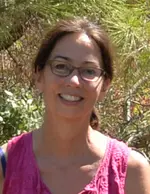Dr. Christina Williamson
christina.williamson@uni-erfurt.deFellow (Max-Weber-Kolleg für kultur- und sozialwissenschaftliche Studien)
Kontakt
Max-Weber-Kolleg (Steinplatz 2) / Raum 506d (4. OG)
Sprechzeiten
nach Vereinbarung
Besucheranschrift
Max-Weber-Kolleg für kultur- und sozialwissenschaftliche Studien
Campus
Nordhäuser Str. 63
99089 Erfurt
Postanschrift
Universität Erfurt
Max-Weber-Kolleg für kultur- und sozialwissenschaftliche Studien
Postfach 90 02 21
99105 Erfurt

Zur Person
I am a Senior Lecturer in Ancient History at the University of Groningen in the Netherlands. My doctorate, fulfilled in 2012 at the same university, concerns the role of ‘extra-urban’ sanctuaries and urban identity in Asia Minor in the Hellenistic period. From 2014 to 2015 I conducted postdoctoral research at Brown University, under the title ‘Commanding views. ‘Commanding views. Monumental landscapes and the territorial formation of Pergamon, 3rd to 2nd centuries BC’, funded by the Netherlands Organisation for Scientific Research (NWO). Currently I am co-director, with Onno van Nijf, of the NWO project ‘Connecting the Greeks. Multi-scalar festival networks in the Hellenistic world’, consisting of two PhD projects and my own post-doctoral project on festivals and placemaking.
Forschungsprojekt
Festival hubs. Deep-mapping sanctuaries in the ancient Greek world
In the ancient Greek world, religious festivals served to establish the identity of a community while creating ties with others. Such festivals, their gods, shrines and rituals have long been examined within the framework of religious history, state formation processes, or architectural configuration, yet are rarely considered as a whole in all their complexities. Festivals were multi-vocal, they could operate at multiple scales, from the global, involving rulers and delegations, the regional, with delegations and reciprocal acts, and the local, including civic politics, the local elite, but also ‘the crowd’ of spectators and worshipers. All of these found ways of linking their own identity to that of the festival and its sacred spatial setting, whether this was through new civic architecture, honorific monuments, pious dedications, or graffiti and stories remembered.
This project aims to set out a framework for a new approach to such sanctuaries in the vital Hellenistic period (c. 300-30 BC), as it seeks to understand them through the lens of place-making. A GIS environment is envisioned in which a wide range of material and immaterial data can be ‘geo-tagged’ and located in chronological layers that should together reveal the larger and multi-vocal web of spatial narratives. This will result in a deep map that will lend itself for further network and social analyses.
During my time in Erfurt, I will be exploring methodologies for this integrative approach, including network theory, (spatial) conceptualizations of place-making processes, and digital tools.
Publikationen (aktuelle Auswahl)
- Submitted. Urban rituals in sacred landscapes. Country sanctuaries and civic transformation in Hellenistic Asia Minor, Religions of the Graeco-Roman World series, Leiden: Brill.
- 2018. ‘Filters of light. Greek temple doorways as portals of epiphanies’, in E.M. Opstall and S. de Blaauw (eds), Sacred Thresholds. The Door of the Sanctuary in Late Antiquity, Religions in the Graeco-Roman World 185, Leiden: Brill, 309-340.
- 2016. ‘A Carian shrine in a Hellenizing world. The sanctuary of Sinuri, near Mylasa', in M. Paz de Hoz Garcia-Bellido, J.P. Sánchez Hernández and C. Molina (eds), Between Tarhuntas and Zeus Polieus. Cultural crossroads in temples and cults of Graeco-Roman Anatolia, Colloquia Antiqua 17, Leuven: Peeters, 75-100.
- 2016. ‘Mountain, myth, and territory. Teuthrania as focal point in the landscape of Pergamon’, in J. McInerney and I. Sluiter (eds), Landscapes of Value. Natural Environment and Cultural Imagination in Classical Antiquity, Proceedings from the Penn-Leiden Colloquia on Ancient Values VIII, Leiden: Brill, 70-99.
- 2016, with O.M. van Nijf, 'Connecting the Greeks. Festival networks in the Hellenstic world', in: C. Mann, S. Remijsen and S. Scharff eds, Athletics in the Hellenistic world, Stuttgart: Franz Steiner Verlag, 43-71.

